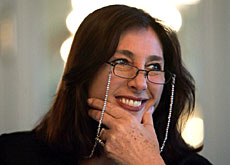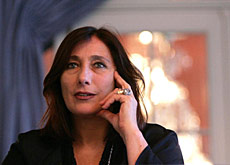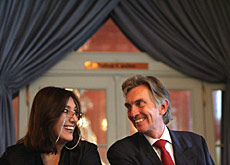Bignardi reflects on her legacy to Locarno

The 58th Locarno Film Festival, which starts on August 3, will be the last under the artistic direction of Irene Bignardi.
In an interview with swissinfo, Bignardi looks back at her five years at the helm of Switzerland’s largest film festival and speaks of the challenges facing her successor.
Both the Italian-born Bignardi and her deputy, Teresa Cavina, are stepping down this year. The new director will be announced after the ten-day festival finishes.
swissinfo met the former journalist at Locarno’s headquarters – which is a hive of activity ahead of the event.
Bignardi receives us in her office with a broad smile, despite a diary full of engagements.
swissinfo: What were the main reasons behind your resignation?
Irene Bignardi: Simply a desire for a new challenge. Five years at Locarno is a long time, the Venice Film Festival’s director, for instance, is appointed for a period of four years.
But they have been five wonderful years and I believe I shall be leaving a distinctive legacy. I have no complaints, except that the life of the festival director is very tiring. Now I want to take charge of my life again.
swissinfo: What memories will you be taking with you?
I.B.: I shall certainly remember the Locarno team’s passion for the cinema, which was maintained even under the most stressful conditions. But there have also been depressed times when things went badly.
In our mainly female team there was no director or deputy director. All of us knew we were working on a joint project, to be carried out to the highest possible standards.
And we have achieved some significant results. We provided a platform for Afghan filmmaking, barely three months after the end of the war.
Locarno was also the launch pad for Indian cinema, which has since become very fashionable.
swissinfo: Which of these achievements gives you the greatest satisfaction?
I.B.: It’s difficult to say. Perhaps taking the risk of screening the Bollywood film Lagaan, which lasted 3 hours and 40 minutes, in the Piazza Grande and then finding that it was so popular that we had to arrange more showings. That was really satisfying. We took a gamble and it paid off.
There have also been a lot of minor innovations that I count as successes, such as the meetings with writers we organised in 2001.
The Locarno audience is very special. People do not come here in search of glamour or big names, but of filmmaking in all its aspects. Essentially, we have turned Locarno into a small arts festival. I say this because we have broken through the boundaries of traditional film festivals, although Locarno still remains very much a film festival.
swissinfo: How difficult is it nowadays to direct a festival, especially a festival like Locarno? And how difficult is it for a woman?
I.B.: The difficult thing for a woman is having to live away from home, which for me is Rome. That’s where my family is and my books.
The festival director’s life is a difficult one. It is true that there we do not lack funding, but our funds are still limited compared with the competition. Berlin, for instance, has a budget twice the size of ours.
Locarno also has some problems of its own. Firstly, the time of year, which is inconvenient. Not only because it is the holiday period, but also because it falls at a time when many films are being made.
Furthermore, the festival’s backing is provided by a small country with four language communities and where the power of film distributors on the international market is very limited.
There is also something innately fragile about the event: those magic moments when films are shown in Piazza Grande are subject to the vagaries of the weather. And there is also an accommodation problem because many hotels have gone out of business.
All in all, life is complicated for any festival director, but for the director of the Locarno Film Festival it is even more so.
swissinfo: What does the festival most need most, apart from the essential ingredient of love of the cinema?
I.B.: It needs people who will love Locarno and appreciate its potential. Locarno would not be on the international map, except as a delightful little town on the shores of Lake Maggiore, were it not for the festival.
Locarno radiates an image of Switzerland which is international, cultivated and independent. And when there are good Swiss films – and this year there are – it provides a showcase for Swiss cinema. The festival also has a very positive impact on the economy.
swissinfo: What is your mood ahead of your final festival?
I.B.: The same as on previous occasions. But with a slight sense of liberation – not from Locarno, not from the festival, but from my tiredness.
swissinfo, Françoise Gehring in Locarno
The festival runs from August 3 to 13.
15 films will be competing for the Golden Leopard award.
14 films will be screened in Piazza Grande.
The government has promised funding of SFr3.6 million ($2.82 million) for the next 3 years.
In 2004 the festival was covered by 900 newspapers from 39 countries.
Irene Bignardi was born in 1943. She studied Modern Literature in Milan and Communications at Stanford University in the United States.
She worked as a copywriter for Olivetti and Italian state broadcaster RAI. She has also worked as a film critic for Espresso and La Repubblica.
Bignardi’s favourite film, Robert Altman’s Nashville, will close the festival. Among the directors she most admires are Federico Fellini and Billy Wilder.

In compliance with the JTI standards
More: SWI swissinfo.ch certified by the Journalism Trust Initiative


You can find an overview of ongoing debates with our journalists here. Please join us!
If you want to start a conversation about a topic raised in this article or want to report factual errors, email us at english@swissinfo.ch.